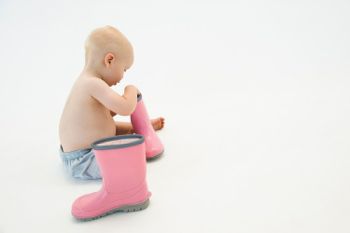Wanted; Midwives - and too much pink?
Friday 17th of May 2013 | Category: Baby News | Written by: Leoarna MathiasCall the Midwife
A piece on the BBC news website earlier this year highlighted the need for a greater number of midwives in the UK. Tweeters are sporting 'twibbons' on their avatars in support of the issue, and the 'Send a Baby to your MP' campaign organised by Midwife for Me is attracting a sizeable following. So how come there aren't enough midwives here in the UK?
Just recently, a friend of mine successfully applied to train as a midwife. Competition for places on the course was fierce; there were something like 700 applicants for 40 places. One attraction of the course is the availability of a bursary to cover living expenses and the lack of tuition fees; students thus effectively receive a modest salary, a rare thing in the current higher education marketplace, and avoid the extreme levels of debt. With the popularity of programmes such as One Born Every Minute and Call The Midwife, perhaps we shouldn't be surprised that so many people are considering it as a genuine career calling. What's is more odd, however, is the seeming lack of positions open to midwives when they do qualify, that in turn leads to many choosing to leave the course for fear of not finding a position once there training is over.
Over on Pregnancy.co.uk we refer to the vital role midwives can play during your pregnancy and beyond many, many times over. Too many times, in fact, for us to pick out just one or two links; and I guess that says it all really. Midwives are too important to not be prioritised by policy makers; let's hope that the current government was listening when over 76,000 people signed the Royal College of Midwives e-petition for 5000 more NHS midwives last August.
Colourblind?
Another issue currently attracting a lot of social media attention is the Let Toys Be Toys campaign. In essence, those behind the campaign are calling on toy manufacturers and retailers to bring to an end the 'fluffy-stuff-for-girls, science-and-soldier-stuff-for-boys' divide that can often dominate the store shelves. Started by Mumsnetters, but now attracting a strong following, the campaigners have focused attention on retailers as high-profile as Toys R Us, Tesco and even Marks & Spencer, as they break down the age-old pink/blue divide.

Now, I have a habit of retaining random facts from QI, one of which reminds me that it has not always been thus. In the Victorian era, little boys wore pink, and girls wore blue, as pink was seen as a close relation to red, a masculine colour. No-one is quite sure why the switch occurred; but what we do know is that pink is now well and truly embedded in our nation's consciousness as a feminine colour. There is even a serious body of research that explores evolutionary psychology and the possible innate preference little girls appear to have for the colour. And beyond stereotypical colour-coding, the kinds of toys marketed at young girls and young boys do vary dramatically. We can all guess why Baby Annabel or Mechano is advertised in the way that it is, but do we stop to think about the potential impact of such marketing on our young children? I'm certainly no expert in the field, but I can't help thinking that there is a correlation between the absence of 'girls' science kits, and the lack of women entering engineering professions. Would we be surprised if someone established a link between the impossible-to-achieve 'feminine' figure of Barbie, and the warped and damaging self-image so many young girls have of their own physical appearance through their teenage years and beyond? Possibly not.
Here on Babies.co.uk we try and give you sensible advice about present buying and the gifts you get from others for your child and we would never want to be to soap-box-esque about a subject that is, after all, very much an issue of personal choice. But we would encourage you to give your children, as they grow from baby to toddler, the chance to explore a wide range of toys and resources, and spare them the gender-stereotyping that is, after all, still very much present in our society.